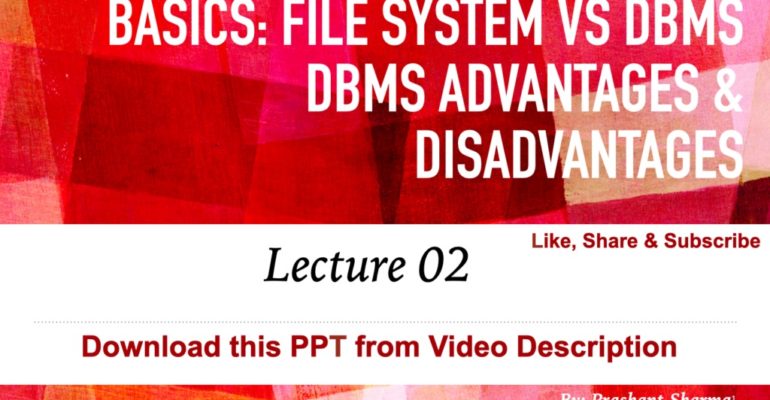DBMS Advantages and Disadvantages, Limitations of File Systems

DBMS Advantages and Disadvantages, Limitations of File Systems
Topics: Limitations of File Based System, DBMS Advantages and Disadvantages in very basic easy Hindi Language.
Presentation Download:
 Loading...
Loading...
Limitations of File Based System
SEPARATION & ISOLATION OF DATA
It is difficult to access the data which is isolated and stored in separate files. Imagine we have to generate a single report of student, who is studying in particular class, his study report, his library book details, and hostel information. All these informations are stored in different files. How do we get all these details in one report?
DUPLICATION OF DATA (REDUNDANCY)
There is uncontrolled duplication of data in the file-based approach. Duplication is waste of space and it costs time and money to enter the data more than once.Additional space requirements leads to additional costs.Duplication of data means that the data is no longer consistent which leads to Loss of Data Integrity.
LOSS OF DATA INTEGRITY
Imagine Student Details and Student_ReportCard files have student’s address in it, and there was a change request for one particular student’s address.
The program searched only Student Details file for the address and it updated it correctly.
There is another program which prints the student’s report and mails it to the address mentioned in the Student_ReportCard file.
What happens to the report of a student whose address is being changed? There is a mismatch in the actual address and his report is sent to his old address. This mismatch in different copies of same data is called data inconsistency (loss of data integrity).
DATA DEPENDENCE
The data stored in file depends upon the application program through which the file was created. It means that the structure of data files is coupled with application program.
INCOMPATIBLE FILE FORMATS
The structure of files are dependent on the application programming languages. The structure of a file generated by a PYTHON program may be different from the structure of a file generated by a ‘C’ program. The incompatibility of such files makes them difficult to process jointly.
FIXED QUERIES OF PROGRAMS
File-based systems are very dependent upon the application developer, who has to write any queries or reports that are required. There was no facility for asking unplanned queries about the data or about the type of data available.
Advantages of Dbms
CONTROL OF DATA REDUNDANCY
DBMS tries to eliminate the redundancy by integrating the files so that multiple copies of the same data are not stored. DBMS does not remove the duplication entirely but can control the amount of duplication. Sometimes it is important to duplicate key data to model relationships, improve performance.
DATA CONSISTENCY
By eliminating or controlling redundancy, we reduce the risk of inconsistencies occurring.If a data item is stored only once in the database, any update to its value has to be per- formed only once and the new value is available immediately to all users. If a data item is stored more than once and the system is aware of this, the system can ensure that all copies of the item are kept consistent.
SHARING OF DATA
Database is a shared resource which can be shared with different authorized departments. New applications can build on the existing data in the database and add only data that is not currently stored, rather than having to define all data requirements again.
IMPROVED DATA INTEGRITY
Database integrity refers to the validity and consistency of stored data. Integrity is usually expressed in terms of constraints, which are consistency rules that the database is not permitted to violate.
IMPROVED SECURITY
DBMS protects the database from the unauthorized users. This may take the form of user names and passwords to identify people authorized to use the database. The access that an authorized user is allowed on the data may be restricted by the operation type (retrieval, insert, update, delete).
INCREASED CONCURRENCY
DBMS ensures concurrent data access so that there is no loss of information. DBMS provide access to multiple users to access the database at the same time.
IMPROVED BACKUP & RECOVERY
Backup and recovery in general refers to the various strategies and operations involved in protecting your database against data loss and reconstructing the data should that loss occur.
DATA INDEPENDENCE
DBMS separates the data descriptions from the applications, thereby making applications immune to changes in the data descriptions. This is known as data independence.
It refers to the immunity of user applications to changes made in the definition and organization of data
Disadvantages of Dbms
|
Complexity |
The provision of the functionality we expect of a good DBMS makes the DBMS an extremely complex piece of software. |
|
Size |
DBMS is a large software, occupying many megabytes of disk space and requiring substantial amounts of memory to run efficiently . |
|
Costs |
Cost of DBMS Software, Additional Hardware Costs and Cost of Conversion |



